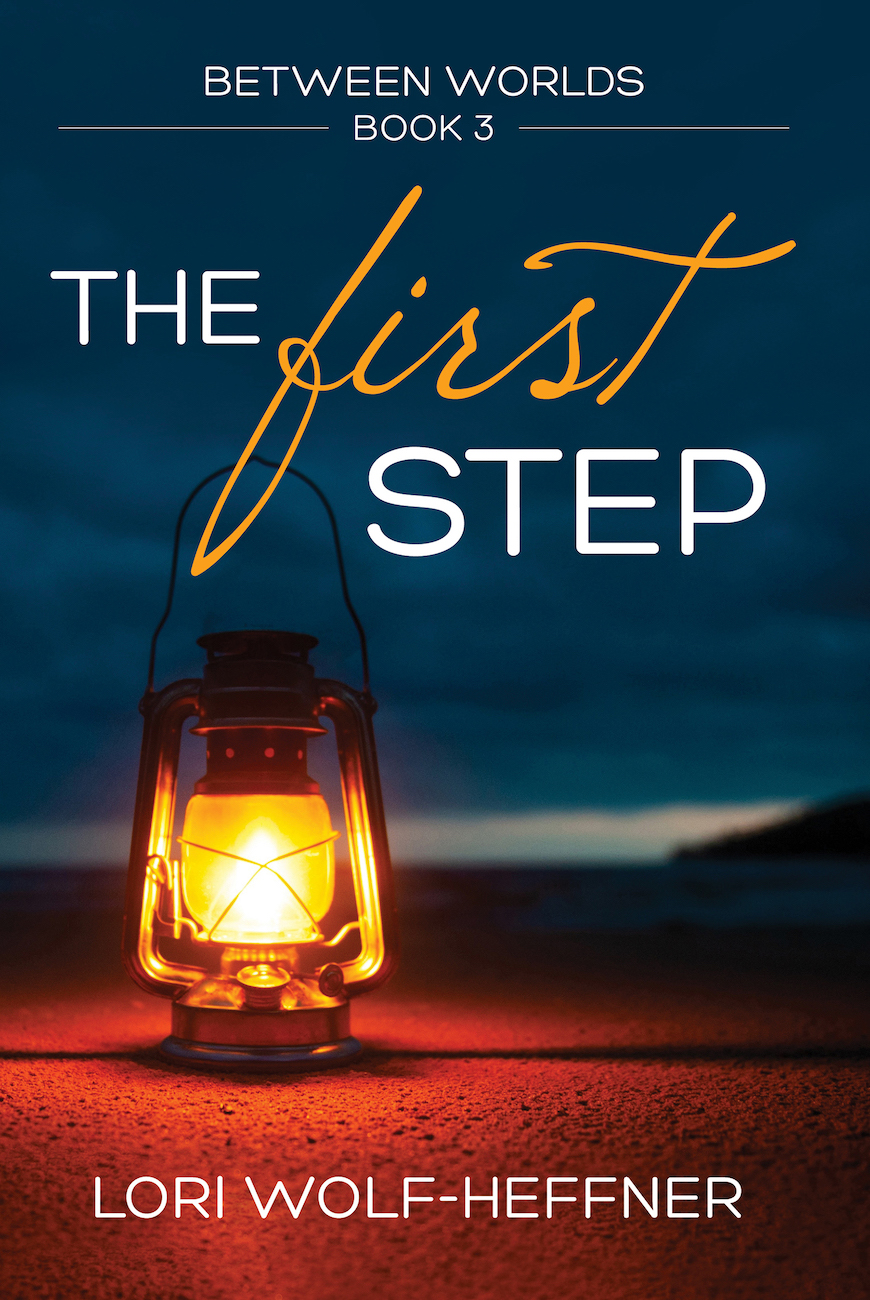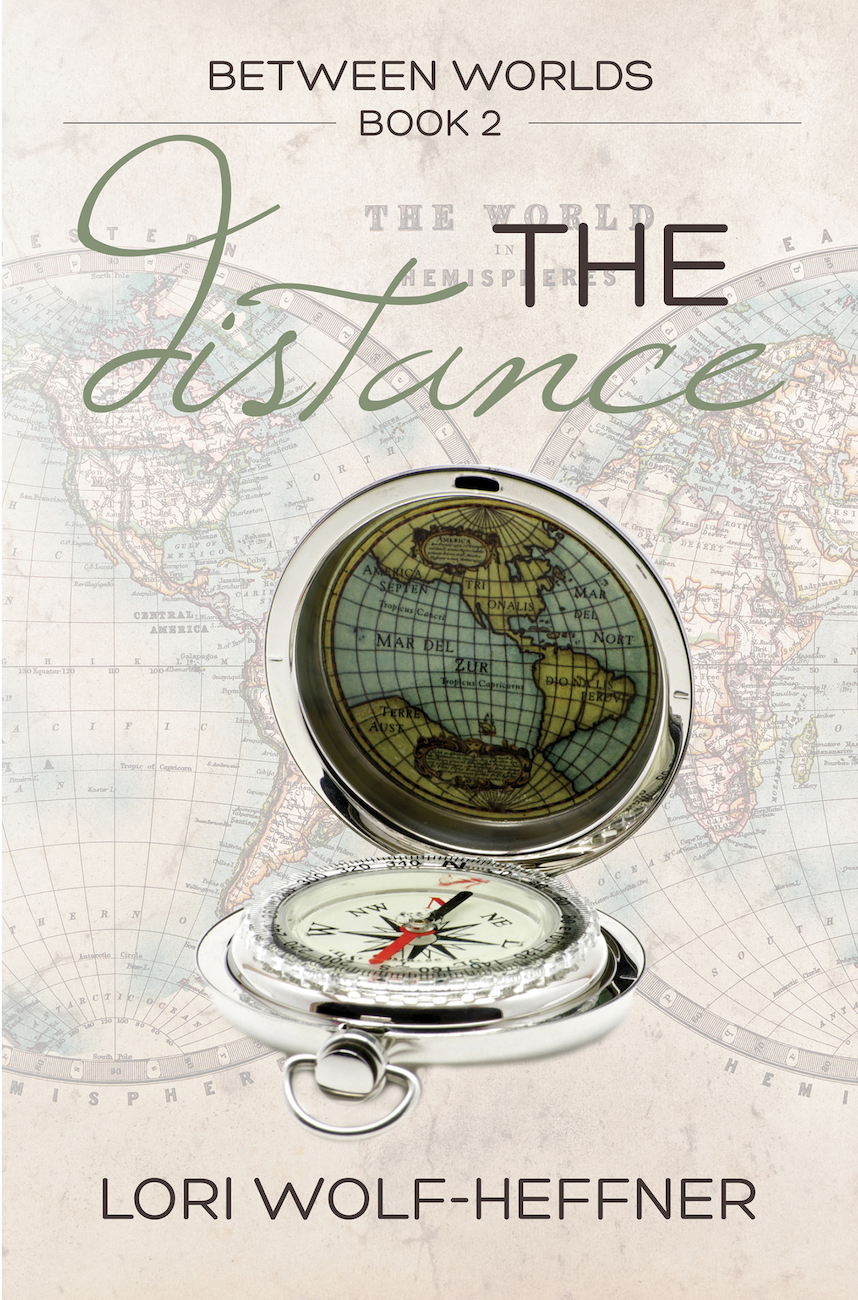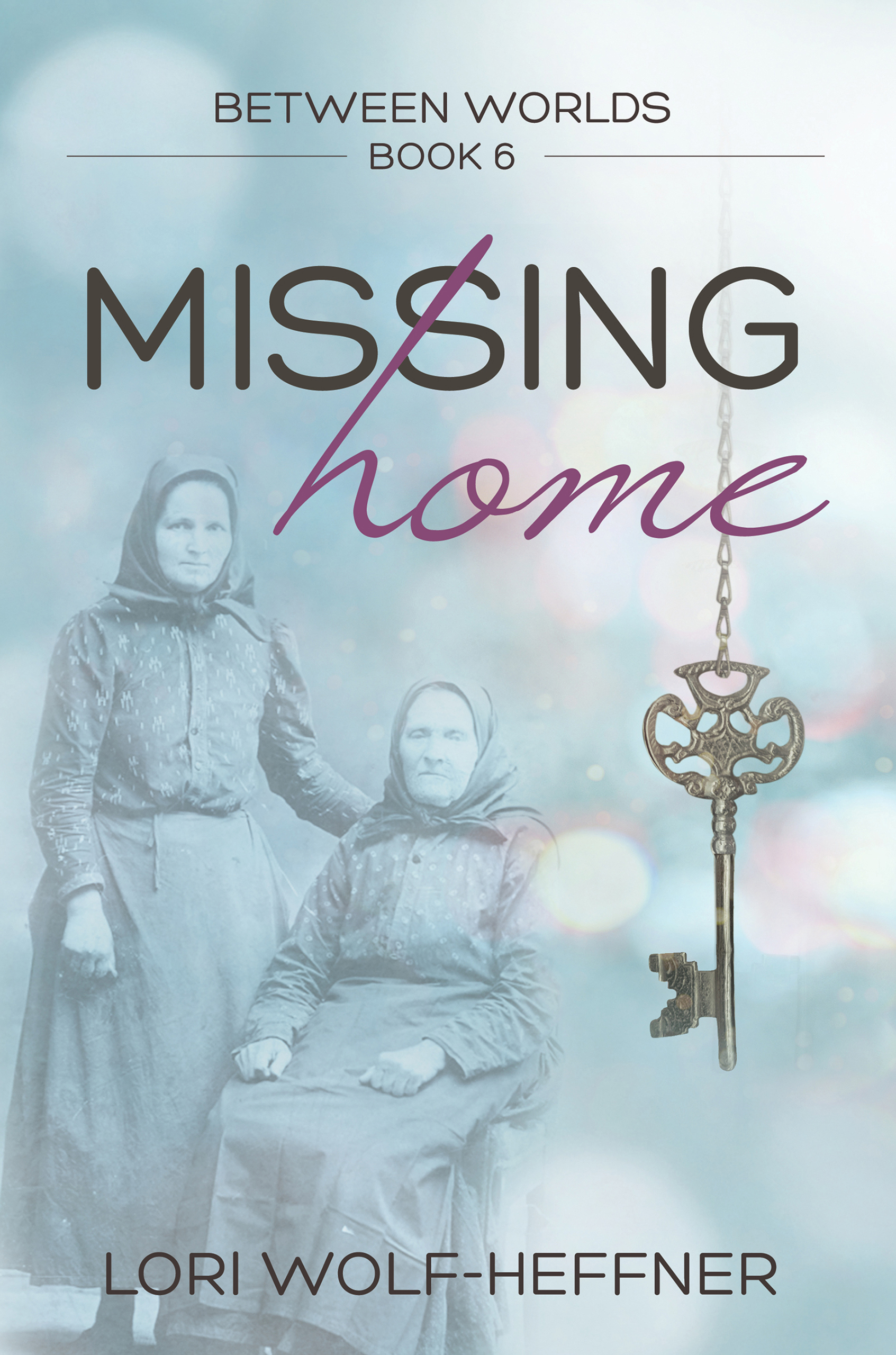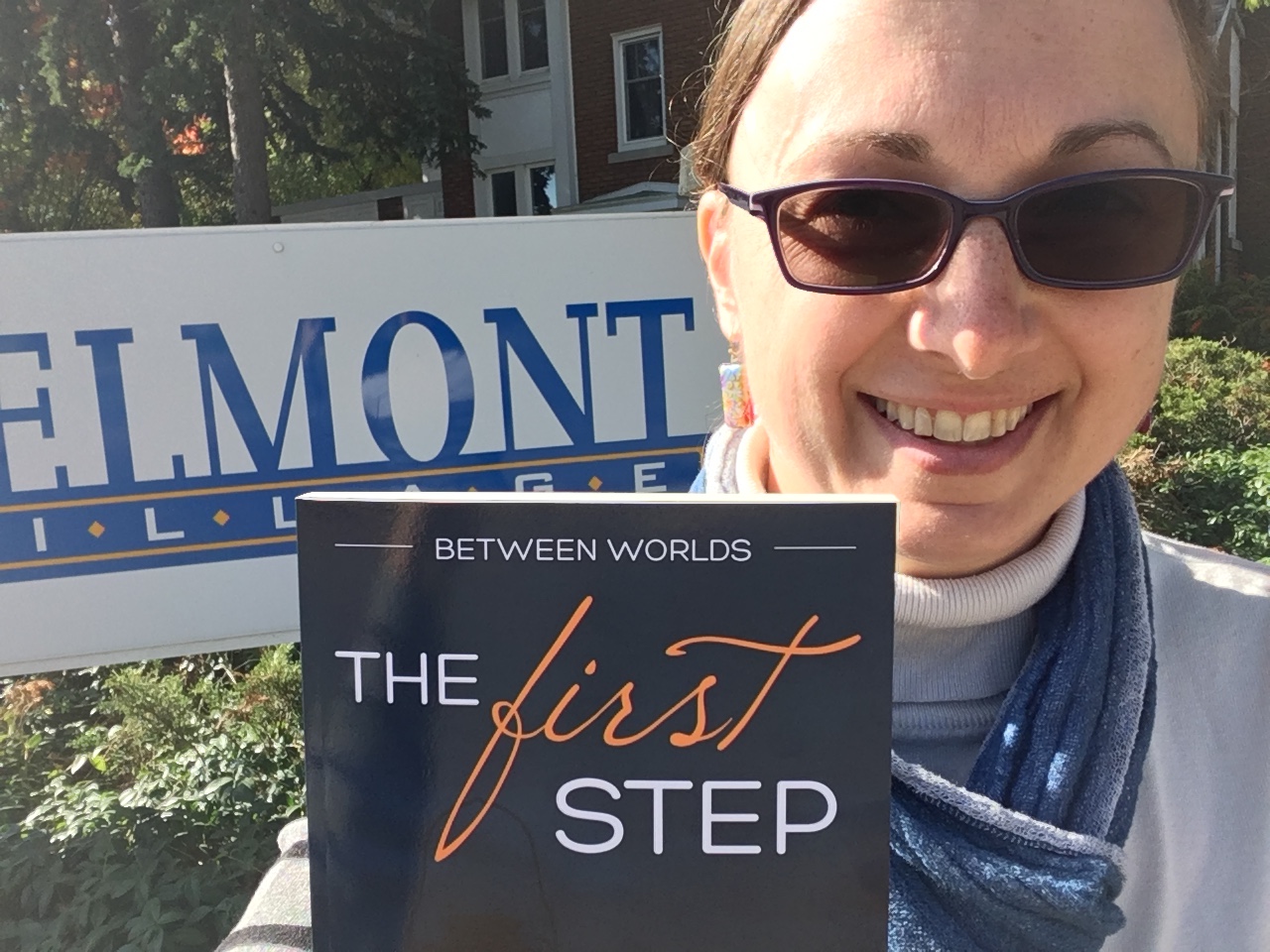Can a sketchbook from the past help Juliana move forward?

Between Worlds 3: The First Step
Growing up is hard enough. Why does family make it harder?
Fourteen-year-old Juliana didn’t expect to be the one looking after her grandfather, who lives with Alzheimer’s. But with her parents always at work, she feels they barely have time for her, let alone Opa. Add studying for exams at her new school, and Juliana doesn’t know how she can focus on her grades while also caring for Opa on her own. Conflicted, she turns to the one thing that has helped her find solace since her move: her great-grandmother’s sketchbook.
Crotchety Omama has invited herself to stay with Elisabeth’s family. But when Omama insists Elisabeth punish her brother by hitting him and conspires with Mammi to introduce her to her first marriage prospect, Elisabeth must decide for herself what discipline and marriage look like according to God’s will. Even if that differs from her family’s expectations.
With family responsibilities bearing down on Juliana and Elisabeth, the girls must learn to balance their needs with what their families and society expect of them.
The First Step is the third book in Lori Wolf-Heffner’s contemporary/historical series, Between Worlds. If you love history, the arts, and family ties, pick up a copy of The First Step and enjoy a story that spans generations.
"I just finished reading your third book and my hands are shaking! I have always been an emotional reader but this book has been a rollercoaster! I am counting the days to your next book."
 Reader
ReaderBuy Between Worlds: The First Step
Canada
US
International
Take a Peek...
Juliana looked at the time on her computer: 5:02. Which meant it was 3:02 in Calgary. Rachel wouldn’t be home from school yet. She stared at her notes. How was she going to get all this information into her head? Her new class had spent the entire month of November learning a mental health unit while she only had two weeks to learn it before the exam.
“This couldn’t be more unfair,” she said to herself as she began to make study notes from her class notes. Her only other option would be to take two courses during the summer but having to take one was already bad enough.
Juliana opened her great-grandmother’s book and flipped through the drawings. If only I could dance like she could draw, Juliana thought. She turned to a drawing near the front again, a picture of the back of an envelope about to be opened. She wondered what could be so important about an envelope that had compelled Omama to draw it.
Slow footsteps down the hallway interrupted her thoughts: Opa was coming. Unlike Mom and Dad, he never knocked before entering her room, but his footsteps always announced his presence.
He poked his head into her room. “Yulika,” he said,using his nickname for her. “Annie won’t be coming forsupper tonight. Sophie and little Scott are both sick. Stomach flu.”
Annie was Mom’s sister, Aunt Anne to Juliana. Of the three Schuhmacher siblings, she was the one with the big family: six kids.
“That’s too bad.” Secretly, Juliana half-wished they’d come over so she could catch their bug and have an excuse to not study all this material.
As Opa shuffled back down the hall, Juliana realized that this meant Aunt Anne would not be cooking supper. With Dad away and Mom at work, that left Juliana to prepare the meal. However, of all the tasks Juliana was ever asked to do in the house, the absolute worst was anything in the kitchen. Or I could study, she thought.
She stuck her head into the hall. “Opa, I’ll cook us something.” Opa turned around and shook his head.
“It’s all right. I know you have to study. We’ve got cereal and milk. We’ll be fine.”
But Juliana knew that one of the reasons the Roths had moved to Kitchener in the first place was that unless Aunt Anne came to cook, Opa would eat only cereal and milk, or summer sausage sandwiches. He had never learned how to cook, not even after Oma had died, and any attempts to hire a meal delivery service had been met with a stubborn refusal. Or so Mom had said. But as soon as they had moved in, Mom had insisted on the service. Aunt Anne offered to continue cooking for another two weeks, allowing Juliana’s parents to adjust to their new lives and Opa to adjust to his new cooks. After that, she could focus on her family again.
That didn’t help with tonight, though, and Juliana needed something more nutritious than cereal before dance. She closed her laptop and followed Opa out to the kitchen.
“It’s time for a break for me, anyway.”
“All right. I’ll just be downstairs,” he said. “I don’t want to miss the six o’clock news.”
“But Opa, it’s just past five.”
“All the more reason to hurry. There’s this big story in the newspaper about rubber workers and I don’t want to miss it,” he said and headed to his room in the basement, leaving Juliana confused. What did the newspaper have to do with missing the news on TV? Or was that just a slip of the tongue? But if it was, was he always this worried aboutbeing late for something? Because she didn’t know her grandfather well, she had a hard time telling what was dementia and what was just his personality.
Juliana opened the fridge and surveyed her possible ingredients and then checked the freezer, where she found a frozen apple core. Had Opa left it there?
“Now you’re being paranoid,” she said to herself as she took it out and threw in the green bin. “You’ve put a box of cereal in the fridge before.” But deep down, she wasn’t so sure.
...
Back from dance that night, Juliana and Mom took their boots off at the landing by the side door.
“I’m sorry,” Mom said. “Your first day of school and then you’re left to cook on top of that. We should figure out another plan.”
“It was just this one evening, no big deal. We had tons of food, so I found something for us.” She grabbed an apple and a handful of almonds and sat down at the table. Mom followed suit.
“Listen, Juliana,” she said, “I’m afraid much of this weekis going to look like today. I’ll be home to drive you, but I think I’ll be working at least sixty hours this week.”
Juliana’s shoulders drooped. “Seriously? Your first week on the job and you can’t work even just, you know, like regular people?”
Mom put her apple on the table. “The place is an absolute mess. I’ve got workers who don’t care an ounce about their jobs, there was mouldy produce almost everywhere I looked, the floors are dirty because the cleaning company rarely shows up with a full complement of staff, and I found a whole pallet of flour sitting outside. Thankfully, that company knew how to package it so bugs couldn’t get in, but no one wanted to move it. So, yes, it’s going to be like that.”
“Great. So I’m cooking all week? When I have to get ready for exams? I’ve got so much to learn, I don’t know how I’m going to get it all done.”
Mom shook her head. “No, of course you’re not cooking all week. Stop being so dramatic. I’ll use my lunch break tomorrow to bring home some food you can just throw in the oven if Anne can’t make it tomorrow or Wednesday. I’m off Thursday, and your dad’s back on Friday.”
But Juliana knew it wouldn’t happen that way. Everytime her parents said it would be fine, it wasn’t. Too tired to debate it further, though, she grabbed her snack and bag and dragged her tired feet to her room.
“Good night,” Mom called after her.
“Yeah,” Juliana replied and closed her bedroom door behind her. She looked at herself in her full-length mirror. “I have to go to school, study, dance, and practice. And guess who’s also going to have to cook?”
Elisabeth carried a bowl of boiled potatoes to the kitchen table, where Omama, Mammi, and Luki already sat waiting for supper. Anna set the table and then took her seat, rocking her chair as she waited, while Rosina carried over cheese, bread, and butter before kneeling on her chair. All that was needed was the duck, which Elisabeth now pulled out of the oven and set on some tea towels in the middle of the table.
“Elisabeth, get me some water,” Omama said, and Elisabeth obliged.
Just as Elisabeth was about to sit down, Mammi instructed her to carve the duck and serve everyone.
“But you’re the head of our household,” Elisabeth said, confused.
“And I’ve worked hard enough outside. Or are you suggesting that you work harder in here?” Mammi’s accusation took Elisabeth aback. She had meant no such thing: she was just confused by the change of routine. But without saying another word, she carved the duck, placed a slice on each person’s plate, and helped her siblings cut their portions.
“Mammi, I want school to start again,” Anna said, rocking on her chair.
“Psht!” Mammi said. “You do not speak at the table! And sit like a woman.”
Anna looked down at her plate of food. Elisabeth began slicing her own duck. Then Luki spilled his glass of water. Elisabeth raced to the back room to get tea towels and returned to find Anna rocking again.
“Anna, stop it.” Why wasn’t she listening? There were adults in the room. Or was she trying to get her older sister in trouble?
“It’s your job to discipline her,” Omama said. “You are in charge.”
Elisabeth prayed that Anna would listen to her andavoid forcing an uncomfortable confrontation between Elisabeth and their grandmother. She dried Luki’s spill and sat down, hoping to finally start eating, only to catch Rosina trying to pour water from the water jug. Fearing another accident, Elisabeth helped her.
“Aaahhh!” Anna screamed as her chair tipped back. Anna’s head hit the ground, and Elisabeth immediately rushed to help her sister up.
“If you had sat like a woman,” Mammi said, “this wouldn’t have happened.”
Omama nodded in agreement. “You should have listened to your mother.” Neither got up to help, and Elisabeth wondered how their words helped at all. She didn’t know the Bible off by heart, of course, but she could not think of a single passage where Jesus spoke that way. And was it not a Christian’s duty to be like Him?
So far as Elisabeth could tell, though, Anna hadn’t heard a word of it: she was wailing.
“Shh,” Elisabeth said to her sister as she helped her up. “Eat the rest of your food. You’ll feel better soon.”
Still sniffling, Anna nodded while Elisabeth placed herchair back at the table. Anna sat down and picked at her food.
“That is no way to teach her,” Omama said. “She’ll only do it again.”
Elisabeth’s shoulders tensed. Why on earth would Anna rock her chair again after such a fall? Even if she did, a gentle reminder about her fall should be enough to deter her the next time. Elisabeth sometimes wondered if adults really did understand children the way they said they did.
Another string of requests from everyone, though, meant that by the time Elisabeth finally sat down to eat, everyone else had finished their meal. Elisabeth often counted on her meals as breaks from her endless list ofchores. Hopefully Omama and Mammi would give her enough time to eat.
“Anna, Rosina, go into the front room and work on your projects. Luki, try not to be a nuisance,” Mammi instructed.
“He can practice polishing shoes,” Elisabeth offered. Mammi raised her eyebrows. “A very good idea, Lissika. Luki, continue with your practice.”
Luki sulked, but one look from Omama wiped it off his face. The three younger siblings disappeared into the warm room of the house and Mammi closed the door behind them.
Elisabeth’s heart started to race. Had she done something wrong? Said something to embarrass her mother? Insulted Omama in someway?
Mammi stood with her back to the door and looked Omama in the eye. Elisabeth didn’t think her heart could race any faster.
“We need to talk about your future,” Mammi began. Elisabeth kept eating. “You turn fifteen this summer. It’s time we start finding you a husband.”
Elisabeth’s hand with its forkful of duck froze halfway along its path to her mouth. A husband? Am I ready for one already?
“You still have much work to do,” said Omama. “You need to stop speaking up like you do, especially the way you did at church on Christmas Eve. The Bible says, ‘Let your women keep silence in the churches: for it is not permitted unto them to speak; but they are commanded to be under obedience, as also saith the law.’”
Upon hearing that verse, Elisabeth bristled. “But Krehling Maria and Wagner Anna were speaking up at a time when it was wrong to do so.”
Omama wagged her crooked finger at Elisabeth. “That is for Jesus to judge, not you.”
But Mammi had approved Elisabeth’s speaking up: the other women had been criticizing Pastor Fröhlich’s preference for Hungarian as the language of worship in thechurch and of instruction in the schools, though the children currently learned in Romanian as the new laws dictated. Christmas Eve was an inappropriate time to discuss such topics. Was Elisabeth supposed to stay silent and let those women disturb the sanctity of the church with a political discussion?
“Modr, Elisabeth still has much to learn,” Mammi said, clearly not taking either side, at least not in front of her mother. “She has at least two years to find someone, and I will help her learn what she still needs to know.”
Omama nodded and broke off a piece of bread from the loaf that still sat on the table. “Does that mean she’ll learn to stop smiling so much?”
Omama’s question angered Elisabeth, but she swallowed her words. Her mother had told her in the past to smile less, because otherwise people would think she looked stupid. But smiling means someone is happy and enjoying what Jesus has blessed them with. Why should I not show that?
“You must always be on your best behaviour,” Omama said. “Just like your husband must respect you, you must respect him, and that means learning your role in the family.”
Elisabeth smiled at Omama, who scowled back. Even Mammi shot her oldest child a look of mild scorn.
“Now,” Mammi said, “we’ve invited someone to tea tomorrow to discuss the pigpens. I expect you to be polite to him.”
Maybe Mammi meant it would be a young man. Elisabeth nodded.
“Good. Get your sisters and begin cleaning up the kitchen,” Mammi commanded. “Luki and I will head back to the workshop.”
Mammi believed Elisabeth was ready to marry and receive her haube, and to have a family. Elisabeth smiled, jumped up from her chair, and called her siblings. Excitement filling her soul, she ignored Omama’s comments about smiling.
The Between Worlds Series

Between Worlds 2: The Distance
How can family rifts be healed when problems from the past keeps pulling them apart?

Between Worlds 3: The First Step
Growing up is hard enough. Why does family have to make it harder?

Between Worlds 4: What Friends Do
Friends hold our hands and light the way through tragedy, no matter how far away they live.

Between Worlds 5: Hide And Seek
When do you give up on a search for a family treasure?

Between Worlds 6: Missing Home
Can a move half way across the country be a blessing in disguise?

Between Worlds 7: What Will Come
Time will march forward, no matter how terrifying the future seems.

Between Worlds 8: A Father's Journey
Sometimes a parent’s love, even when deeply desired, can become overwhelming.
All books are also avaliable in large print!
About Lori Wolf-Heffner
Lori Wolf-Heffner began baton twirling as a toddler. But one bonk on the head from that shiny stick sent her to jazz class instead, leading Lori into a successful competition dance career that culminated with becoming an inaugural member of the Canadian National Tap Team in 1996.
In 2015, the Canadian Senior Artists' Resource Network accepted Lori into their one-year mentorship program. Mentored by Carol McQuaig, Lori wrote the first version of Postcards in a Closet, a creative non-fiction memoir about Katharina Wolf, a great-grandmother who was a single mom-to-be in the aftermath of World War I. At first printed only for family, Lori published it later for the public.
Inspired by her great-grandmother’s story, Lori wrote and published Between Worlds 1: The Move in 2018. The rest, as they say, is history.

